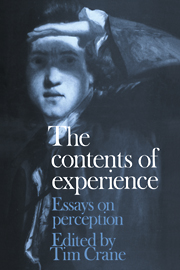Book contents
- Frontmatter
- Contents
- Preface
- Notes on contributors
- 1 Introduction
- 2 The puzzle of experience
- 3 How to interpret ‘direct perception’
- 4 Experience and its objects
- 5 Scenarios, concepts and perception
- 6 The nonconceptual content of experience
- 7 Visual qualia and visual content
- 8 The projective theory of sensory content
- 9 Sight and touch
- 10 The diversity and unity of action and perception
- References
- Index
10 - The diversity and unity of action and perception
Published online by Cambridge University Press: 22 September 2009
- Frontmatter
- Contents
- Preface
- Notes on contributors
- 1 Introduction
- 2 The puzzle of experience
- 3 How to interpret ‘direct perception’
- 4 Experience and its objects
- 5 Scenarios, concepts and perception
- 6 The nonconceptual content of experience
- 7 Visual qualia and visual content
- 8 The projective theory of sensory content
- 9 Sight and touch
- 10 The diversity and unity of action and perception
- References
- Index
Summary
In this paper I investigate some of the most important relations holding between action and perception. There is reason to believe both of these phenomena are essential constituents of the psychological life of animals. The farther we go back in evolutionary history, the more they tend to occupy of the mind. Indeed, extrapolating backwards to the very simplest of animals, it looks as if active executive function and perceptual cognitive function must all but exhaust the psychological repertoire of the creature. While this does not imply that action and perception are primitive phenomena, it ensures that they are fundamental and in all probability essential to animal life. Then it would be interesting to discover how these elemental inhabitants of the mind manage at the same time to be both absolutely antithetical in character, and profoundly co-operative in function. Accordingly, my discussion polarises into a consideration of issues of antitheticality and issues of unity.
The relation of perception to action
Before I come to grips with specific questions, a word about layout. My intention in this paper is to examine some of the main relations, mostly causal and/or functional in character, that the phenomenon of perception bears to the phenomenon of action – and vice versa. That is, two particular families of relations. Now in carrying out these two distinct inquiries, due recognition must simultaneously be given to the fact that action takes two ontological forms: mental (internal) action, and physical (bodily) action.
Information
- Type
- Chapter
- Information
- The Contents of ExperienceEssays on Perception, pp. 216 - 266Publisher: Cambridge University PressPrint publication year: 1992
Accessibility standard: Unknown
- 9
- Cited by
